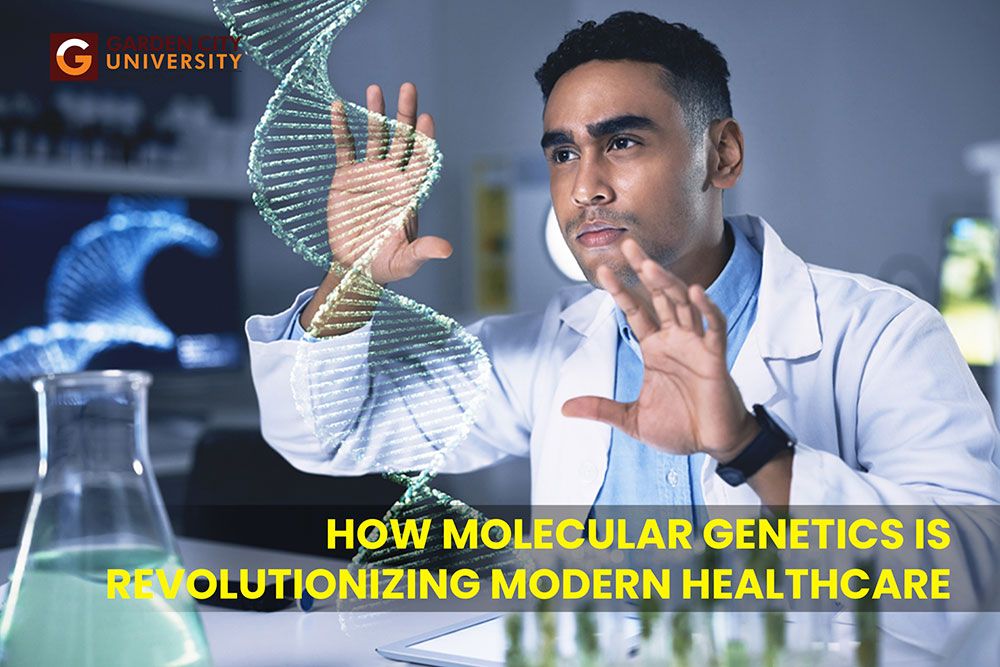
In recent years, molecular genetics has emerged as a game-changer in modern healthcare. The integration of genetic insights in clinical practice has transformed the way doctors diagnose and treat illness. The future of medicine will become more precise, personal and proactive as we unlock the secrets in our DNA.
This blog explores how molecular genetics is changing the landscape of healthcare and why it is an excellent career choice for those aspiring to be life science professionals.
What is Molecular Genetics?
The study of the structure and functions of genes on a molecular scale is called Molecular Genetics. It is a branch of biology that studies the structure and function of genes at a molecular level. Scientists can understand disease states and how cells work by examining DNA and RNA.
This field is crucial in many areas of medicine. From understanding inherited diseases to developing targeted cancer therapies, this field has a huge impact.
Personalized Medicine: Treating the Individual, not the Average
Personalized medicines are one of the most exciting uses of molecular genetics in healthcare. Genetic testing allows doctors to tailor treatments based on a patient’s genetic profile.
As an example:
- Genetic testing can be used to determine the most effective chemotherapy for cancer patients.
- Early prevention is possible for people with a predisposition genetically to certain diseases, such as Alzheimer’s or breast cancer.
This personalization improves the likelihood of success in treatment and reduces adverse effects.
Diagnose diseases faster and more accurately
Effective treatment depends on an accurate and early diagnosis. The development of advanced diagnostic tools based on Molecular Genetics allows for the detection of diseases in their earliest stages, even before symptoms are visible.
Now, genetic tests are available.
- Newborn screening can identify inherited disorders.
- By analyzing the pathogens’ genetic material, you can detect infectious diseases such as HIV or COVID-19.
- Diagnose rare genetic disorders previously difficult to diagnose.
The right treatment can be given to patients at the right moment, improving their outcomes and even saving lives.
Gene Therapy: Hope for Genetic Disorders
Gene therapy is a new and exciting outcome of molecular genomics. Gene therapy is a way to fix the genetic defects causing disease, rather than treating symptoms.
Some examples of gene therapies include:
- Treatment of spinal muscular atrophy among infants
- Correction of gene mutations that cause certain types blindness.
- Explore cures for blood diseases like hemophilia and sickle cell disease.
Although still in its infancy, gene therapy is a promising way to cure many diseases that are currently incurable at the genetic level.
Pharmacogenomics: Reduced trial and error in drug prescriptions
Pharmacogenomics, an offshoot from molecular biology, studies how genes influence a person’s response to medication. This allows doctors to prescribe drugs which are likely to be safe and effective for an individual.
This is the approach:
- Reduces side effects.
- Treatment is accelerated.
- Avoid ineffective drugs to reduce costs.
This is a great example of how the use of genetics can lead to a more patient-centred and efficient healthcare system.
The role of Molecular Genetics for Preventive Healthcare
In addition to treatment, molecular genetics plays an important role in preventive healthcare. Doctors can use genetic risk factors to recommend lifestyle changes, early intervention, and screenings.
This proactive approach can be particularly helpful in managing chronic diseases like diabetes, heart problems, and certain types of cancer. It improves quality of life while reducing healthcare costs.
Study Molecular Genetics and Biotechnology at Garden City University, Bengaluru
Healthcare continues to change, so professionals with backgrounds in molecular biology and biotechnology will be in high demand in research laboratories, pharmaceutical companies and hospitals.
Consider pursuing a degree in biotechnology at Garden City University, Bengaluru, if you are passionate about genetics. GCU’s cutting-edge laboratories, highly qualified faculty and industry connections will equip you with the knowledge and skills needed to succeed in this dynamic field.
FAQs About Molecular Genetics and Its Role in Healthcare
The study of gene functions and genetic diseases at the molecular scale is called Molecular Genetics. It is crucial in healthcare as it can help diagnose genetic diseases and develop targeted treatments.
The use of molecular genetics by doctors allows them to examine a patient’s genome to determine their response to certain treatments. This allows for more effective and personalized healthcare.
By identifying genetic factors early, healthcare providers can recommend preventive actions such as lifestyle modifications, regular screenings or medications to reduce the risk of certain diseases.
Some of the key applications are genetic testing for inherited disorders, cancer genomics and newborn screening. Pharmacogenomics (drug reaction analysis) and infectious disease diagnosis (e.g. COVID-19-PCR testing) are also important.
You can study M.Sc. Molecular & Human Genetics With Specialization In Clinical Embryology at Garden City University, Bengaluru. GCU provides industry-relevant courses, advanced labs, and hands-on experience to prepare students for careers as researchers, healthcare professionals, or pharmaceuticals.
Final Thoughts
Molecular genetics goes beyond science. It’s the driving force behind many of today’s most innovative innovations in healthcare. Genetic science has a profound impact on our lives. From personalized therapies to revolutionary therapies, it is changing the world every day.
Enroll at Garden City University in Bengaluru to begin your career in molecular and biotechnology.
